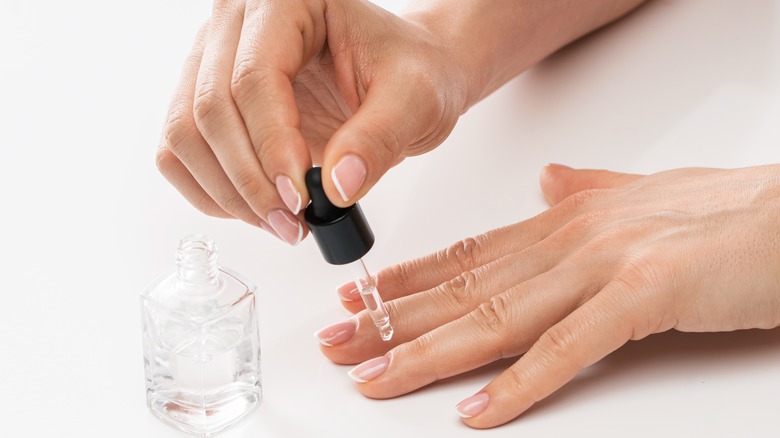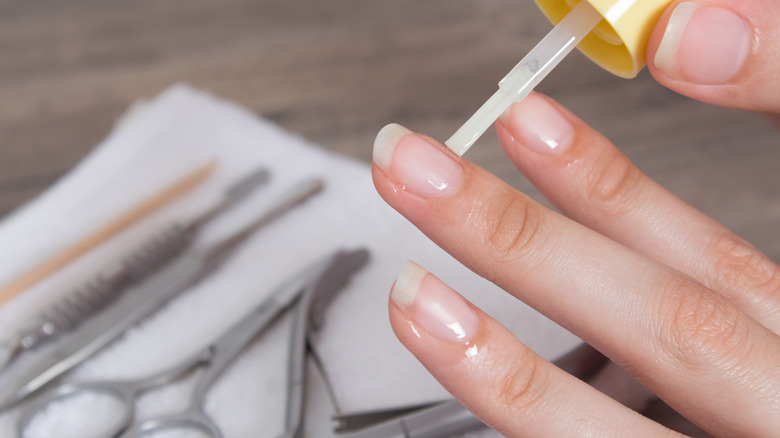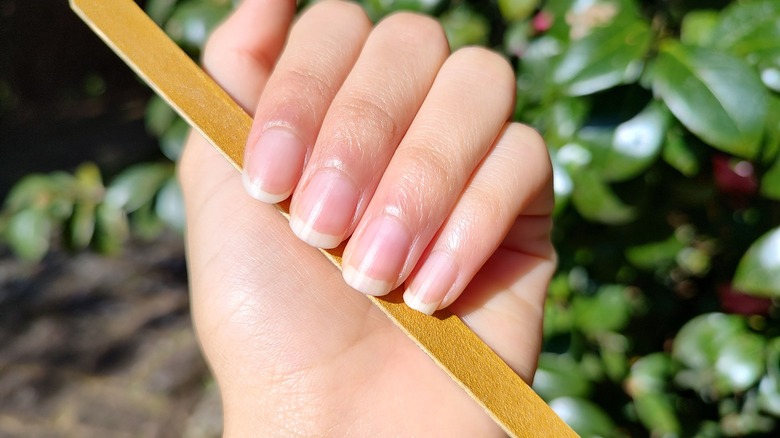Does Cuticle Oil Really Help Your Nails? (We Know You Have Enough Products As It Is)
You don't really need much to keep your nails healthy. Arguably one of the most low-maintenance parts of the human body, the American Academy of Dermatology Association notes that to maintain healthy nails, all you need to do as far as upkeep goes is keep them clean, trim them regularly, and avoid biting and picking at them.
But it's a whole different story if you love your manicures and nail art. Booking trips to the salon and coating your talons with all sorts of fun colors is always exciting, but you're also risking nail discoloration and cuticle damage if you do it frequently. Gel polish doesn't come off easy, after all. With frequent buffing and scraping, your cuticles are almost always compromised in the process, and it's the last thing you want to happen if you want to keep your nails in tip-top shape.
Cuticles exist to protect the "nail matrix" or "the brain of the nail," which controls the "health of the nail that then grows through," explained nail expert Lynn Gray to Get the Gloss. "The nail matrix is where new cells develop and where old cells are pushed forwards to form the visible part of the nail, so the quality and health of the cells that are being produced in the matrix will determine the condition of the nail as it grows through."
Keeping your cuticles intact is integral to nail health, but does one really need products like cuticle oil for maintenance? Or is it yet another superfluous product?
Cuticle oil helps keep them moisturized
If your cuticles are healthy, your nails will be healthy too. But cuticles are notorious for being perpetually sensitive. Even if you're not too fond of manicures and nail polish, you can still experience dry cuticles from overwashing of the hands, the use of harsh soaps and sanitizers, and cool temperatures. And when they're dry, they can get damaged, or worse, infected. Cuticle oil helps keep them moisturized. It's specially formulated to soften the surrounding skin and nail beds, resulting in hydrated cuticles.
"Think of it like applying moisturizer on your skin," sundays founder Amy Lin shared with Mbglifestyle. They also help in protecting the nail beds as well as prevent the formation of hangnails, aka those pesky pieces of skin that "hang" around your nail area and are painful when ripped out. "Cuticle oil helps prevent dead skin from growing onto the natural nail," celebrity nail tech Tammy Taylor added.
What cuticle oil can't do, however, is facilitate nail growth. It may do a lot in terms of moisturizing, but it doesn't help in making your nails grow faster and stronger. "Cuticle oil does not specifically stimulate nail growth," says dermatologist Dr. Hadley King clarified to InStyle. "But it can help to keep the nails and the skin around the nails healthy by optimizing the skin barrier function."
A guide to cuticle health
Even if the nails (and the surrounding area) are not particularly high maintenance, you may still want to take steps to care for your cuticles, especially if your hands are prone to dryness. Apart from moisturizing with lotion or cuticle oil, you should make it a point not to remove them, even if your manicurist says so. (And besides, they're probably not a good nail tech if they suggest doing so.)
Instead of removing them, you may want to gently push the cuticles — just be careful if you do. "Aggressive pushing, for example with a metal tool or orange stick, can cause damage to the nail matrix, the growth center of the nail," dermatologist Dr. Dana Stern told Byrdie. It's also recommended that you massage your cuticles once in a while, so whatever moisturizing product that you apply gets absorbed much faster. "This makes a significant difference in product absorption, allowing all of the vitamins and nutrients in the formula [to better penetrate] the targeted areas," she added.
And whatever you do, avoid biting your nails and cuticles. Not only does this habit lead to soreness and swelling, but in some cases, you also risk developing an infection. "As our cuticles are our nails' first line of defense, damage to our cuticles can result in infections around the nails," dermatologist Dr. Charlotte Birnbaum pointed out to Allure. "In nail biters, we can see bacterial infections, herpesvirus infections, and easier spread of warts around nails."


